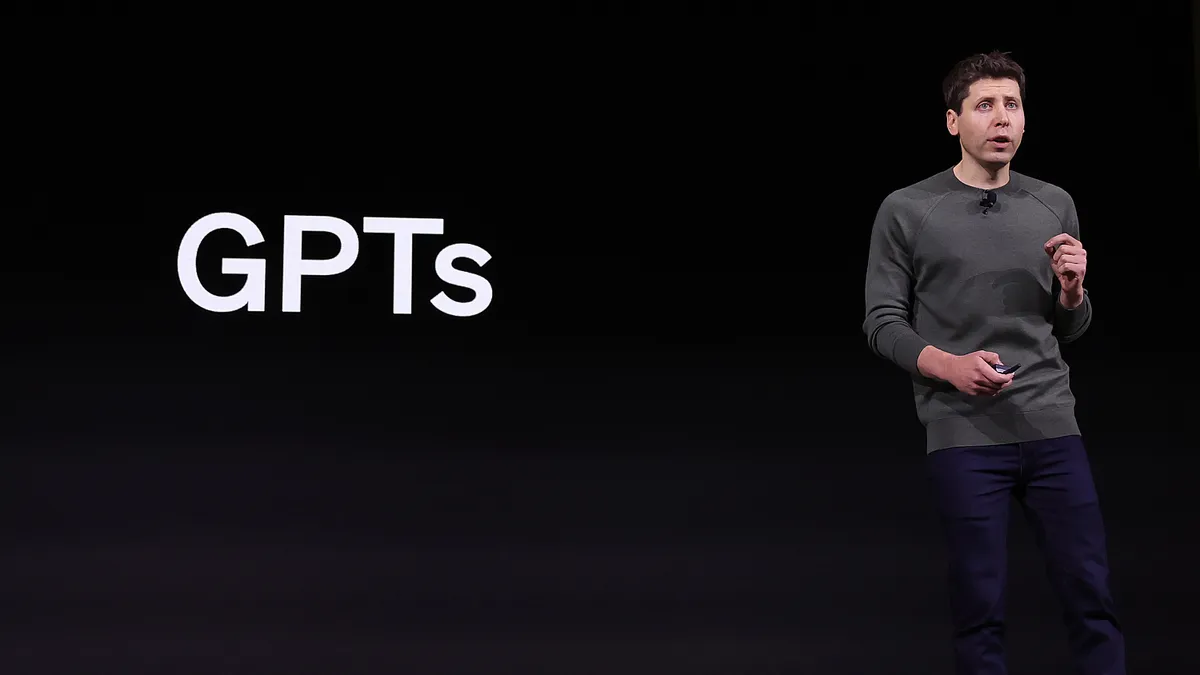Dive Brief:
- Big Four accounting firm PricewaterhouseCoopers will become both the largest customer and first reseller of generative AI provider OpenAI’s enterprise ChatGPT product, according to an agreement announced Wednesday.
- The company will resell OpenAI’s enterprise tool, first debuted in August, to businesses, “in conjunction with services we provide,” Bret Greenstein, partner and generative AI leader for PwC said.
- “I think if you're selling it to a finance team, CFOs, they're not interested in just, general GenAI,” Greenstein said in an interview. “They're interested in, ‘how do I better handle invoices or contracts?’”
Dive Insight:
The deal comes as financial professionals are continuing to eye how GenAI solutions could impact their businesses.
Finance chiefs are determining how the technology could apply to areas including both back-office functionalities, such as invoices, as well as “the direct things that happen within finance, which is interacting with data through natural language, getting more self-service kind of use cases,” Greenstein said, citing conversations CFOs have had with the firm.
Finance chiefs are also in a key place to assess the efficiencies and gains of the technology across the entirety of the business, Greenstein said. Considering AI’s return on investment is likely to be a key part of the CFO role in future years as the technology seeps further into the finance function, CFO Dive previously reported.
“We've been helping CFOs…to understand how transformative generative AI can be in IT, and in marketing and in HR and any other shared service they support,” Greenstein said.
Greenstein declined to comment on how pricing for the reselling of ChatGPT enterprise will work. In addition to enabling the Big Four firm to act as a reseller, the team-up with OpenAI also provides its employees in the U.S. and the U.K. access to the Microsoft-backed business’ latest AI model, ChatGPT-4.
“The rest of the globe is considering their own rollout plans, and we're an independent network of firms so they get to set their own pace and strategy and adoption,” Greenstein said of other markets.
Incorporating GenAI into its workforce will help to complement “our audit, tax and consulting services with a broad array of business and industry solutions,” the accounting firm said in the release. PwC was already developing “custom GPTs” that could aid with processes such as the review of tax returns, proposal response generation, dashboard and report generation and other practical applications, according to the press release. The integration of the latest ChatGPT model can help to augment such offerings.
The OpenAI team-up is only the latest step by PwC to incorporate generative AI solutions into both its customer offerings and the tools utilized by its auditors and employees. Last year, the firm announced it would be investing $1 billion into generative AI technology over a three-year period to help build out the technology, funneling a further $1 billion into its auditing services, CFO Dive previously reported. Fellow Big Four firms including KPMG and Deloitte are keeping pace; both announced GenAI initiatives and funding within the past year.
Moreover, GenAI is already filtering more widely into the workplace, signifying a “decisive tipping point,” PwC said. The Big Four firm is already utilizing GenAI with 950 of its 1,000 U.S. consulting clients, and is in talks about the technology’s applications with many of its audit customers, showing increasing openness and demand for the technology’s use, according to the Wednesday announcement.
As professionals consider AI’s use cases, OpenAI’s enterprise product has seen swift adoption since it was first launched in August, touting more than 600,000 users as of this April, according to a report by Bloomberg.
While such fast adoption indicates promise on the part of the technology, some reports suggest businesses may be moving slower to incorporate AI into their workflows. A survey by the European Commission found that of businesses with more than 10 employees in the European Union, only 8% reported utilizing AI to conduct their business last year, and that certain types of use cases were more popular among enterprises than others. A greater percentage of companies used AI to automate different workflows or assist in decision-making than to generate written language, for example.
Another study found individual use of generative AI technology remains relatively rare, with just 7% of survey respondents in the U.S. utilizing ChatGPT on a daily basis, according to a study conducted by the Reuters Institute.
While companies are swiftly adopting AI solutions, it is still the early innings of enterprise transformation, Greenstein said.
“I think there's a lag between what AI can do, and companies’ abilities to adopt it and to transform with it,” he said.












